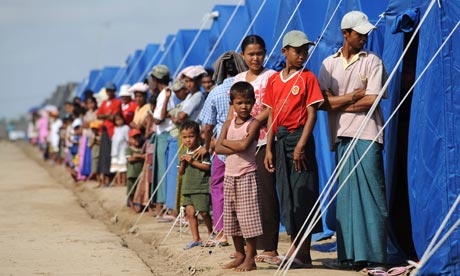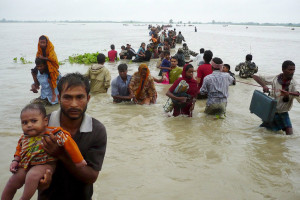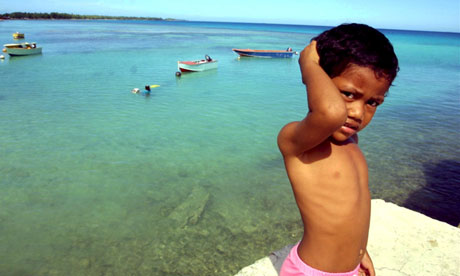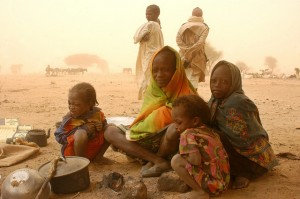 |
| Refugees move from their homes into to a camp in Zimbabwee. Source: Treehugger. |
Climate change is not only about the planet it is about people. The changing world we live in challenges how we should live our lives day to day alongside changing the locations where we are able to do so. This is not is not only about where people will move to, but it challenges the fact we are living in a finite world. When people are displaced, the whole international system is turned upside-down. Our current system is inadequately prepared to deal with climate refugees. As Navy Vice Admiral Lee F. Gunn states, “addressing the changes in the Earth’s climate is not simply about saving polar bears and preserving the beauty of mountain glaciers. Climate change is a threat to our national security”. The only way to deal with the issue of climate refugees is by preventing it from occurring. If we do not begin to discuss this issue then a serious question remains: can we reverse the changing climate before it comes at the cost of displacing 150 million people around the world?
Climate
refugees do not only cause stress on the land, but they limit access to
adequate food and water supplies as well. University of Vermont’s Geography
Department Professor Pablo Bose, a specialist in displacement, has begun to
work with environmental migration. He notes that if climate change continues at
its current rate we can anticipate "loss of life, livelihood and access to land
as well as resources." The interconnectedness between where people are and the
strain it has on the planet is only exacerbated with the climate change. So
displacing a whole country of people can have negative impacts on where they
move to and eventually that land may not be suitable either, continuing the cycle of displacement.
 |
| Refugees displaced by Cyclone Nargis stand outside of the tents they now call home. Source: Guardian. |
There
are three impacts of climate change that lead to environmental migration. They
are: sea-level rise, extreme weather events, and drought or water scarcity
(Biermann and Boas 2010). These three factors will come together to make up the
150 million refugees anticipated by the year 2050.
If climate change continues on its current path of wreckage this will be the
largest refugee crisis in history, displacing 10% of the world’s population
(Environmental Justice Foundation 2014). With mass migration comes a range of other social problems like resource scarcity, conflict, and general problems with assimilation into a new country. If refugees need to move across borders they risk losing their cultural identity on top of other hardships.
Our common future depends on the ability to address the fact that there
is not enough viable land or resources as it is, and climate change will only
serve to make this problem worse. Ilan Kelman, Scientist and co-founder of Many Strong Voices, notes "
 |
| Migrants move swiftly to avoid flooding in Bangladesh. Source: Independent Film. |
Potentially
one of the worst cases of displacement can be seen in the Pacific
Islands. The Maldives is anticipated to be underwater within the next century. With most of its land only five feet above sea
level, the country will be the first to see some of the worst effects of
climate change (Busby 2010). In 2009 President Mohamed Nasheed held a
conference underwater to express the gravity of the situation. Nasheed
noted that the country does not want to see its population of 396,000
people displaced entirely (CNN 2009). The Maldives began setting aside money to
purchase new land for refugees to resettle. That land may be in India, Sri
Lanka, or even Australia due to the fact that there is so much land that is not currently being used.
In 2005, Hurricane Katrina pummeled the coast of the Gulf bringing the concept of climate refugees much closer to home. Not only did the storm overwhelm the levee system, but it then moved inward and continued on its path of wreckage. In total the massive Category 5 storm caused over $81 billion in property damage alongside the massive blow to the infrastructure of New Orleans (National Geographic 2005). The worst damage could be seen in the waterfront where nearly 90% of the land flooded within only hours (National Geographic 2005). Where possible residents of New Orleans are rebuilding rather than moving. However, in the year that followed the Hurricane an estimated 400,000 Gulf residents were still displaced.
 |
| The Maldives host an underwater conference to show how sea-level rise will effect their population. Source: Mother Nature Network. |
In 2005, Hurricane Katrina pummeled the coast of the Gulf bringing the concept of climate refugees much closer to home. Not only did the storm overwhelm the levee system, but it then moved inward and continued on its path of wreckage. In total the massive Category 5 storm caused over $81 billion in property damage alongside the massive blow to the infrastructure of New Orleans (National Geographic 2005). The worst damage could be seen in the waterfront where nearly 90% of the land flooded within only hours (National Geographic 2005). Where possible residents of New Orleans are rebuilding rather than moving. However, in the year that followed the Hurricane an estimated 400,000 Gulf residents were still displaced.
 |
| Destroyed homes lay in the wake of Hurricane Katrina in New Orleans, Louisiana. Source: Wikimedia. |
Climate change does
not hold legal recognition for migration by the international system. Environmental
refugees are not granted asylum in other countries, which contributes to why
people like President Nasheed have been seeking out alternatives such as
outright buying land. It is also important to look at the fact that no one wants to leave the place they call home. Displacement cannot be seen as the answer, as it does not fully address the problem at hand. Soon, sea-level rise will come knocking down the doors of
the East Coast, where will we go? Hurricanes and other strong storm surges have already greeted New England through Hurricane Irene and Sandy over the last few years. We are not immune to the threat of climate change, but are living through it as well. With
the world population currently above seven billion and continually rising, migration
alone does not make sense as a solution. Instead we need to look to mitigate the overarching problem that is climate change.
 |
| A Tuvulu child worries that his home will be underwater in just a few short years. Source: The Guardian. |
Professor
Bose notes that more needs to be done than solely dealing with displacement
stating, “the broader goal has to be changing systems, structures and attitudes
that produce the conditions that degrade environments so much that they become
unlivable. In the shorter and medium
term (as well as the longer) we have to at the same time pay attention to the people
who are most impacted by environmental effects which overwhelmingly are poor
and marginalized communities in the Global South.” Instead of thinking about
where people will go, we need to start to think about what we can do before it reaches that point. We need to internalize the
norm of climate justice and move forward together on the path to a more
sustainable future in all corners of the planet. After all, who would want to
leave the place that they call home?
 |
| Families in East Africa struggle to find food due to the added stress of climate change. Source: UNHCR. |
Works Cited
Ahmed, Saeed. "From underwater, Maldives sends warning on
climate change." 2009.
<http://www.cnn.com/2009/WORLD/asiapcf/10/17/maldives.underwater.meeting/>.
Argos, Collectif. Climate Refugees. MIT Press, 2010. . google.
Barnes, Hannah. "How Many Climate Migrants Will There
Be?" 2013. <http://www.bbc.com/news/magazine-23899195>.
Barnett, Jon. "Security and Climate Change." Global
Environmental Change 13.1 (2003): 7-17. . google.
Biermann, Frank, and Ingrid Boas. "Protecting Climate
Refugees: The Case for a Global Protocol." Environment: Science and Policy
for Sustainable Development 50.6 (2008): 8-17. . google.
Biermann, Frank, and Ingrid Boas. "Preparing for a Warmer
World: Towards a Global Governance System to Protect Climate Refugees."
Global Environmental Politics 10.1 (2010): 60-88. . EBSCO
<http://search.ebscohost.com/login.aspx?direct=true&db=bth&AN=48168988&site=eds-live&scope=site>.
Busby, Joshua W. "Climate Change and National Security."
An Agenda for Action.CSR 32 (2007) . google.
Docherty, Bonnie, and Tyler Giannini. "Confronting a Rising
Tide: A Proposal for a Convention on Climate Change Refugees."
Harv.Envtl.L.Rev. 33 (2009): 349. . google.
Donald, Ros. the IPCC's Report on the Impacts of Climate Change: A
Summary for Everyone., 2014.
Levy, Marc A. "Is the Environment a National Security
Issue?" International Security 20.2 (1995): 35-62. . google.
MacFarquhar, Neil. "Refugees Join List of Climate-Change
Issues." The New York Times 29 (2009) . google.
McNamara, Karen Elizabeth, and Chris Gibson. "We do Not Want
to Leave our Land’: Pacific Ambassadors at the United Nations Resist the
Category of ‘climate Refugees." Geoforum 40.3 (2009): 475-83. . google.
Pearce, Fred. "Climate Refugees Exist but we Don't Know how
Many there are." New Scientist 210.2810 (2011): 6-7. . google.
Williams, Angela. "Turning the Tide: Recognizing Climate
Change Refugees in International Law." Law & Policy 30.4 (2008):
502-29. . google.
No comments:
Post a Comment